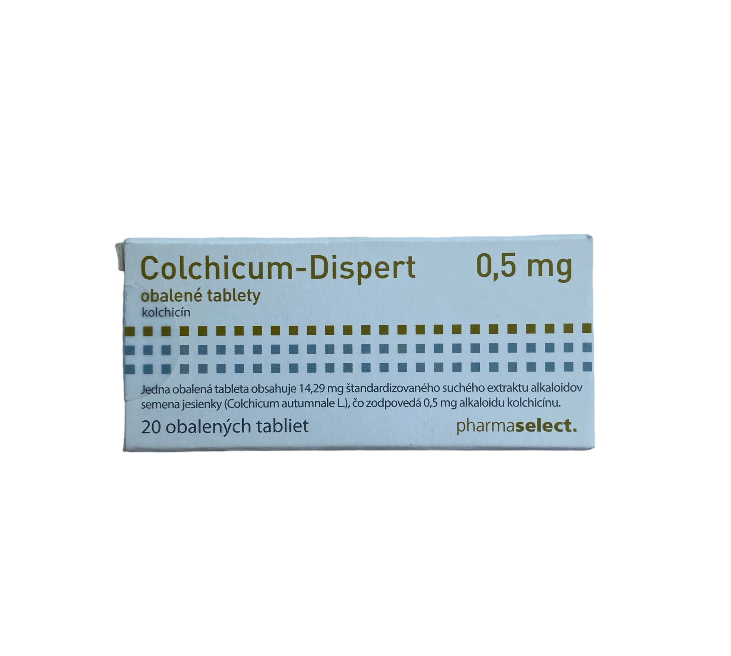COLCHICUM-DISPERT (Colchicine) 0.5 mg 20 tabs
COLCHICUM-DISPERSION (Colchicine) 0.5mg 20 tab
An anti-gouty agent that does not affect the metabolism of uric acid. The anti-gouty effect of colchicine is associated with a decrease in leukocyte migration to the inflammatory site and inhibition of phagocytosis of microcrystals of uric acid salts. It also has an antimitotic effect, suppresses (completely or partially) cell division in the anaphase and metaphase stages, and prevents neutrophil degranulation. By reducing the formation of amyloid fibrils, it prevents the development of amyloidosis. Colchicine does not affect the concentration of uric acid in the blood and tissues
Indications for use:
Prevention and treatment of an acute attack of gout. Treatment of familial Mediterranean fever (periodic illness) in adults and children over 4 years old.
It is highly effective for relieving acute gout. In the first 12 hours of therapy, the condition improves significantly in more than 75% of patients. In 80%, it can cause adverse reactions from the gastrointestinal tract (GI tract) before clinical improvement or simultaneously with it.
A daily dose of 1-2 mg with daily intake in 3/4 of patients with gout reduces the likelihood of recurrent acute attacks.
Prevents acute attacks in patients with familial Mediterranean fever (reduces the activity of dopamine beta-hydroxylase).
Increases the life expectancy of patients with primary AH-amyloidosis. It has a positive effect on the skin (softening, reducing dryness) in systemic scleroderma.
Use during pregnancy and lactation
Taking the drug during pregnancy and lactation is contraindicated.
Contraindications
Hypersensitivity to the active substance or any of the excipients; lactose intolerance, fructose, lactase deficiency, sucrose/isomaltase, glucose-galactose malabsorption (includes lactose, sucrose);
- acute heart failure, hepatic and/or renal insufficiency, severe disorders of the gastrointestinal tract, severe inhibition of bone marrow hematopoiesis;
- colchicine is contraindicated in patients with kidney or liver damage who take P-glycoprotein inhibitors or the CYP3A4 enzyme;
- pregnancy and breastfeeding;
- children under the age of 18.
With caution
Colchicine should be prescribed with extreme caution to elderly and debilitated patients, especially those suffering from kidney, gastrointestinal and heart diseases, and patients with cachexia. When prescribing to patients with diabetes mellitus, it should be borne in mind that the drug contains sucrose and lactose.
Side effects
The frequency of adverse events is classified as follows: very common (>1/10), common (>1/100 to < 1/10), infrequent (>1/1000 to < 1/100), rare (>1/10000 to < 1/1000), very rare (< 1/10000), unknown (cannot be determined from available data).
Disorders of the hematopoiesis and lymphatic system:
Infrequently: leukopenia.
Rarely: thrombocytosis, nosebleeds, bone marrow diseases (aplastic or hemolytic anemia, pancytopenia, neutropenia, thrombocytopenia, agranulocytosis).
Disorders of the nervous system:
Very rare: peripheral motor neuropathy.
Disorders of the gastrointestinal tract:
Often: nausea, vomiting, diarrhea, abdominal pain.
Unknown: profuse diarrhea, gastrointestinal bleeding.
Disorders of the liver and biliary tract:
Unknown: hypertransaminemia, liver damage.
Disorders of the kidneys and urinary tract:
Unknown: kidney damage.
Disorders of the skin and subcutaneous tissue:
Infrequently: alopecia.
Rarely: allergic rash, vesicular bullous rash, hemorrhagic rash, redness of the skin, swelling.
Unknown: allergic rash.
Disorders of skeletal muscles and connective tissue:
Infrequently: myotonia, muscle weakness, myopathy, muscle pain, acute skeletal muscle necrosis.
Disorders of the genitals and breast:
Rarely: azoospermia, oligospermia.
Interaction
In combination with cyclosporine, especially in patients with impaired renal function, the likelihood of developing myopathy increases.
Enhances the effect of depressant and sympathomimetic agents.
It disrupts the absorption of cyancobalamin.
Nonsteroidal anti-inflammatory drugs and other drugs that cause myelodepression increase the risk of leukopenia and thrombocytopenia.
Anti-gouty activity is reduced by cytostatics (increase the concentration of uric acid) and urine acidifying drugs, alkalizing enhance the effect.
Colchicine can be used in combination with allopurinol and uricosuric drugs.
How to take it, the course of administration and dosage
For oral administration. The tablet can be swallowed whole or divided in half according to the risk applied to obtain a single dose of 0.5 mg. In an acute attack of gout, 0.5 mg of colchicine (1 tablet) is taken, then 0.5 -1.5 mg every 1-2 hours until the pain subsides. The total dose of the drug taken per day should not exceed 8 mg. A repeat appointment according to the treatment regimen for an acute attack of gout can be carried out no earlier than 3 days later.
To prevent acute attacks of gout in the first few months of treatment with uricosuric drugs, 0.5 – 1.5 mg is taken daily or every other day for (usually) 3 months.
Manufacturer BETEILIGUNGS (Germany)
Ask a question or inquire about delivery to your country
